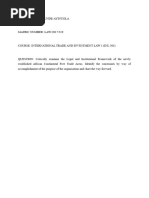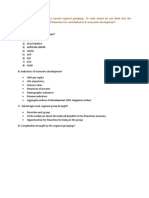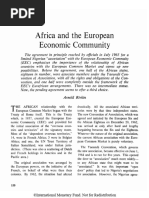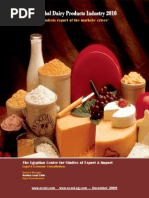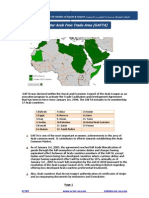The Egyptian Center for Studies of Export & Import اد
The Egyptian Center for Studies of Export & Import اد
Uploaded by
Medhat Saad EldinCopyright:
Available Formats
The Egyptian Center for Studies of Export & Import اد
The Egyptian Center for Studies of Export & Import اد
Uploaded by
Medhat Saad EldinOriginal Description:
Copyright
Available Formats
Share this document
Did you find this document useful?
Is this content inappropriate?
Copyright:
Available Formats
The Egyptian Center for Studies of Export & Import اد
The Egyptian Center for Studies of Export & Import اد
Uploaded by
Medhat Saad EldinCopyright:
Available Formats
The Egyptian Center for Studies of Export & Import "! اد#$ت ا)"('& و ا+#( ى )'را.) ا/ آ.
)ا
The Greater Arab Free Trade Area (GAFTA)
GAFTA was declared within the Social and Economic Council of the Arab League as an
executive program to activate the Trade Facilitation and Development Agreement
that has been in force since January 1st, 1998. The GAFTA includes in its membership
17 Arab countries:
1.Bahrain 7.Libya 13.Sudan
2.Egypt 8.Morocco 14.Syria
3.Iraq 9. Oman. 15. Tunis
4.Jordan 10.Palestine 16.United Arab Emirates
5.Kuwait 11. Qatar 17.Yemen
6.Lebanon 12. Saudi Arabia
♣ GAFTA is one of the most important economic achievements in the area of
Arab common work. It contributes to efforts towards establishing the Arab
Common Market.
♣ As of January 1st, 2005, the agreement reached full trade liberalization of
goods through the full exemption of customs duties and charges having
equivalent effect between all Arab countries members of the GAFTA, except
Sudan and Yemen being less developed countries where customs duties and
charges having equivalent effect will be reduced by 16% annually as of
January 1st , 2005 to reach full exemption by the end of 2010 (pursuant to the
resolution of the Arab League Council at its 14th meeting in Beirut regarding
offering less developed Arab countries preferential treatment).
♣ Also, Arab countries that do not require authentication of certificates of origin
and accompanying documents by embassies and Consulates:
Page 1
ECSEI www.ecsei-eg.com info@ecsei-eg.com
The Egyptian Center for Studies of Export & Import "! اد#$ت ا)"('& و ا+#( ى )'را.) ا/ آ.)ا
The Greater Arab Free Trade Area (GAFTA)
1. Bahrain 7.Oman
2. Egypt 8. Saudi Arabia
3. Kuwait 9. Sudan
4. Lebanon 10. Syria
5. Lybia 11. Tunisia
6. Morocco 12. United Arab Emirates
(certification fees were cancelled but
authentication is still required)
To further contribute to economic integration among Arab countries through
liberalizing trade in both goods and services, Arab countries are currently engaged in
negotiations to liberalize services and investments among them.
Council of Arab Economic Unity:
The Council of Arab Economic Unity agreement was established in June 1957 by a
resolution of the Arab Economic and Social Council of the Arab League. The Council's
objective is to achieve economic integration among Arab countries with the view of
establishing an Arab Common Market. The Council of Arab Economic Unity held its
first session in Cairo in June 1964, being responsible for administrating the
Agreement on Arab Economic Unity and supervising its implementation.
Establishing Countries of The Council of Arab Economic Unity:
1. Egypt 7. Somalia
2. Iraq 8. Sudan
3. Libya 9. Syria
4. Jordan 10.Tunisia
5. Mauritania 11.U.A. Emirates
6. Palestine 12. Yemen
Members of the Council of Arab Economic Unity:
1. Egypt 6. Somalia
2. Iraq 7. Sudan
3. Jordan 8. Syria
4. Mauritania 9. Yemen
5. Palestine
The Council of Arab Economic Unity has under its umbrella a number of agreements
that aim to encourage Arab investments:
♣ Non-Double Taxation,
♣ Tax Evasion, and Establishing Common Rules on Income and
♣ Capital Agreement, signed on Dec. 3rd 1997.
Page 2
ECSEI www.ecsei-eg.com info@ecsei-eg.com
The Egyptian Center for Studies of Export & Import "! اد#$ت ا)"('& و ا+#( ى )'را.) ا/ آ.)ا
The Greater Arab Free Trade Area (GAFTA)
Members up to date are:
Jordan, Sudan, Egypt, Syria, Iraq, Libya and Yemen.
♣ Non-Double Taxation and Income Tax Evasion Agreement, signed on Dec. 6th
1998. Members up to date are:
♣
Jordan, Sudan, Egypt, Syria, Iraq, Libya and Yemen.
Investment Promotion and Protection Agreement, signed on June 7th 2000. Members
up to date are: Jordan, Sudan, Egypt, Syria, Iraq and Libya.
Investment Dispute Settlement in Arab countries, signed on Dec 6th 2000.
Members are: Jordan, Egypt, Syria, Iraq and Libya.
Item GAFTA Agreement
Validity Pursuant to Decision No. 1317 D 59, the Economic and Social Council, at a
meeting held on 19/2/1997, adopted the Executive Program and set a
timeline for the establishment of an Arab Free Trade Area in accordance
with the 1981 Agreement for Facilitation and Promotion of Trade among
Member Countries.
Entry into Force The Agreement entered into force on 1/1/1998.
Duty-Free Products All trade among Arab member countries was subject to a gradual phase-
out from 1/1/1998 until 1/1/2005, which was the timeline set for
establishing the Arab Free Trade Area. During the liberalization process
Member countries were able, as per agreement during the
implementation process, to schedule certain commodities for immediate
liberalization. The FTA applies to all products as follows: Agricultural and
animal products, from Chapters 1 to 24, whether in their raw or processed
form.
During the liberalization process member countries were able to exclude
from tariff reductions certain agricultural products depending on the
production season. However, since 1/1/2005 all agricultural products
became exempt from customs duties and other fees and charges having
similar effect.
Industrial products from HS Chapters 25 up to 96.
Provisions cited in this Program shall not apply to products or materials
banned from importation, circulation or use in any member country for
reasons related to religion, health, security and environment or because
of quarantine rules. Member countries are required to submit a list of
these products, as well as a list of any related amendments.
These provisions do not apply to commodities produced in free zones
where specific procedures are yet to be established in connection with the
treatment of such products.
Preferential Reduction rates reached zero level by 2005.
Treatment
Page 3
ECSEI www.ecsei-eg.com info@ecsei-eg.com
You might also like
- Middle East - Regional Security ComplexDocument19 pagesMiddle East - Regional Security ComplexIoana Iulia Blaga100% (3)
- PHD African Continental Free Trade PDFDocument31 pagesPHD African Continental Free Trade PDFOrlando ArchieNo ratings yet
- Gulf Cooperation CouncilDocument7 pagesGulf Cooperation CouncilAnnonymous963258No ratings yet
- Article 1 IPRI Journal XXIII I - Ali Awadh Asseri OK Final 27 JuneDocument23 pagesArticle 1 IPRI Journal XXIII I - Ali Awadh Asseri OK Final 27 JuneAyesha BukhariNo ratings yet
- IPRI MagzineDocument137 pagesIPRI MagzineLaraib IjazNo ratings yet
- Article 1 IPRI Journal XXIII I - Ali Awadh Asseri OK Final 27 JuneDocument22 pagesArticle 1 IPRI Journal XXIII I - Ali Awadh Asseri OK Final 27 JuneNazeer ahmadNo ratings yet
- 5958Document50 pages5958marcpixel9No ratings yet
- International MarketingDocument13 pagesInternational MarketingSafy Aly SalamaNo ratings yet
- 2018G - 02020-181Gbl - 44 African Countries Sign Continental Free Trade Area AgreementDocument4 pages2018G - 02020-181Gbl - 44 African Countries Sign Continental Free Trade Area AgreementTSEDEKENo ratings yet
- African Continental Free Trade Area (AfCFTA)Document4 pagesAfrican Continental Free Trade Area (AfCFTA)Joy EmmanuelNo ratings yet
- Sobanjo Oluwadolapo Eco 451 Second AssingmentDocument9 pagesSobanjo Oluwadolapo Eco 451 Second AssingmentSobanjo DolapoNo ratings yet
- INTERTRADE ASSIGNMENT FIRST SEMESTER - Edited.editedDocument23 pagesINTERTRADE ASSIGNMENT FIRST SEMESTER - Edited.editedAyinuola OpeyemiNo ratings yet
- Inl502 Assignment ChristianDocument46 pagesInl502 Assignment Christiandavitech44No ratings yet
- WTO Notes to StudentsDocument8 pagesWTO Notes to Studentspritamkarmakar730No ratings yet
- Common Market For Eastern and Southern AfricaDocument7 pagesCommon Market For Eastern and Southern AfricaJeremy JordanNo ratings yet
- Comesa Investment OpportunitiesDocument6 pagesComesa Investment OpportunitiesFeisal AhmedNo ratings yet
- COMESADocument30 pagesCOMESAkutoyakusse69No ratings yet
- Mauritius Regional GroupingsDocument3 pagesMauritius Regional GroupingsTanu NepaulNo ratings yet
- India UAE CEPA AgreementDocument321 pagesIndia UAE CEPA AgreementRajan VNo ratings yet
- GCC ProjectDocument33 pagesGCC ProjectChudhary HaseebNo ratings yet
- Instructor: Ahsan Shah Course: International Business Name:M.Umer RaziDocument5 pagesInstructor: Ahsan Shah Course: International Business Name:M.Umer RaziUmer RaziNo ratings yet
- ComesaDocument45 pagesComesa123sexNo ratings yet
- EnglishDocument171 pagesEnglishSrimathi RajamaniNo ratings yet
- Egypt Mercosur Free Trade Agreement Team 11 PDFDocument12 pagesEgypt Mercosur Free Trade Agreement Team 11 PDFSameh YassienNo ratings yet
- Resrep 19333Document10 pagesResrep 19333Jose LopezNo ratings yet
- Afcfta Sensitization 2 to Customs Staff April 2020Document19 pagesAfcfta Sensitization 2 to Customs Staff April 2020dbk hassanNo ratings yet
- Mizan LR - 14 (2) - Dec - 2020-203-238Document36 pagesMizan LR - 14 (2) - Dec - 2020-203-238mesaymulualem579No ratings yet
- World Trade OrganizationDocument41 pagesWorld Trade OrganizationNamrata Jerajani100% (2)
- Trade AgreementsDocument8 pagesTrade Agreementsahsan.oman1103No ratings yet
- Trade PoliciesDocument2 pagesTrade Policiesmunishka abdille25No ratings yet
- Texte 4-Eco-TsapiDocument3 pagesTexte 4-Eco-Tsapivanessatsapi22No ratings yet
- AfCFTA FACTSHEET A NEW ERA OF TRADE IN AFRICADocument22 pagesAfCFTA FACTSHEET A NEW ERA OF TRADE IN AFRICAnyakeiriNo ratings yet
- Session 1 - International Organisations SAARC OPEC and ASEANDocument17 pagesSession 1 - International Organisations SAARC OPEC and ASEANKKJPGNo ratings yet
- Investment in SudanDocument24 pagesInvestment in SudantaritoamNo ratings yet
- Duks Dissertation FinalDocument64 pagesDuks Dissertation FinalAbdulrahman M. DukurayNo ratings yet
- World Trade OrganizationDocument10 pagesWorld Trade Organizationbangarraju.vvsbNo ratings yet
- Wto & IndiaDocument24 pagesWto & IndiaAnonymous y3E7iaNo ratings yet
- Trade Agreement Between Libya and EgyptDocument3 pagesTrade Agreement Between Libya and EgyptNour FawazNo ratings yet
- Statutory Instrument 64 of 2016 Especially in Relation To The Doctrine of Free Trade and International Trade 1. Question InterpretationDocument11 pagesStatutory Instrument 64 of 2016 Especially in Relation To The Doctrine of Free Trade and International Trade 1. Question InterpretationBrightNo ratings yet
- Trade and Wto 1 62 45Document9 pagesTrade and Wto 1 62 45aarlioconsultsNo ratings yet
- Africa and The EECDocument9 pagesAfrica and The EECTesfaye MekonenNo ratings yet
- GCC:Objectives: Co-Operation Council For The Arab States of The Gulf (GCC)Document6 pagesGCC:Objectives: Co-Operation Council For The Arab States of The Gulf (GCC)aimran333No ratings yet
- SEZDocument22 pagesSEZSonali SharmaNo ratings yet
- Quantitative Restrictions in EacDocument40 pagesQuantitative Restrictions in EacHagenimana TheonesteNo ratings yet
- Asia-Pacific Trade AgreementDocument24 pagesAsia-Pacific Trade AgreementrababNo ratings yet
- POB Technology and The Global Business Environment 2Document12 pagesPOB Technology and The Global Business Environment 2Divine GordonNo ratings yet
- Egypt Import ProfileDocument31 pagesEgypt Import ProfileKarim BakriNo ratings yet
- APRI PB On Trade AfCFTADocument40 pagesAPRI PB On Trade AfCFTATeniNo ratings yet
- Import and Export 2Document35 pagesImport and Export 2SceneCalfNo ratings yet
- Group Assignment: Emba 618, International Trade and InvestmentDocument9 pagesGroup Assignment: Emba 618, International Trade and InvestmenttonydickpatakessehNo ratings yet
- APTADocument35 pagesAPTAShantoNo ratings yet
- Tax Transparency in Africa 2022Document72 pagesTax Transparency in Africa 2022KAKUTANo ratings yet
- Strengthening Africas Capacity To Trade eDocument64 pagesStrengthening Africas Capacity To Trade eYared NigussieNo ratings yet
- SLMUN 2023 - African Union Study GuideDocument24 pagesSLMUN 2023 - African Union Study GuideParinda RatnayakeNo ratings yet
- World Trade OrganizationDocument4 pagesWorld Trade Organizationshashi shekhar dixitNo ratings yet
- Foreign Trade in India World Trade OrganizationDocument4 pagesForeign Trade in India World Trade OrganizationRajiv VyasNo ratings yet
- World Trade Organisation and Global Development 1Document11 pagesWorld Trade Organisation and Global Development 1Saakshi KhandelwalNo ratings yet
- Assignment 201 - FinalDocument12 pagesAssignment 201 - Finalrituag_bitmesra3888No ratings yet
- Sl. No Particulars: Foreign Direct Investment in UAE-CarrefourDocument13 pagesSl. No Particulars: Foreign Direct Investment in UAE-Carrefourazim919No ratings yet
- Wto, UnctadDocument16 pagesWto, UnctadFahad ul AminNo ratings yet
- Sales Contract: by Medhat Saad EldinDocument5 pagesSales Contract: by Medhat Saad EldinMedhat Saad EldinNo ratings yet
- ECSEI International Sale ContractDocument23 pagesECSEI International Sale ContractMedhat Saad EldinNo ratings yet
- Egyptian Guidelines For Good Clinical Practice (GCP) On Pharmaceutical ProductsDocument59 pagesEgyptian Guidelines For Good Clinical Practice (GCP) On Pharmaceutical ProductsMedhat Saad Eldin100% (1)
- The European Free Trade Association (EFTA)Document6 pagesThe European Free Trade Association (EFTA)Medhat Saad EldinNo ratings yet
- مقدمة فى الشحن وعقد البيع الدولى للبضائعDocument11 pagesمقدمة فى الشحن وعقد البيع الدولى للبضائعMedhat Saad Eldin100% (2)
- The European Union Customs TariffDocument1 pageThe European Union Customs TariffMedhat Saad EldinNo ratings yet
- ECSEI International Sale ContractDocument23 pagesECSEI International Sale ContractMedhat Saad EldinNo ratings yet
- A New Basis For International ShippingDocument21 pagesA New Basis For International ShippingMedhat Saad EldinNo ratings yet
- EU Customs 2010Document54 pagesEU Customs 2010Medhat Saad EldinNo ratings yet
- Global Dairy Market Report 2010Document39 pagesGlobal Dairy Market Report 2010Medhat Saad Eldin50% (2)
- CE Mark InterducatonDocument16 pagesCE Mark InterducatonMedhat Saad EldinNo ratings yet
- The European Union Customs TariffDocument1 pageThe European Union Customs TariffMedhat Saad EldinNo ratings yet
- 360 Sewedy E Leaflet English - 3-11Document5 pages360 Sewedy E Leaflet English - 3-11micklemagdy50No ratings yet
- The Egyptian Center for Studies of Export & Import ادDocument3 pagesThe Egyptian Center for Studies of Export & Import ادMedhat Saad EldinNo ratings yet
- WHY Morocco ?: OCTOBER 2021Document15 pagesWHY Morocco ?: OCTOBER 2021أمين الدرقاويNo ratings yet
- Abdelrahman Salah ElsharkawyDocument6 pagesAbdelrahman Salah Elsharkawysara.elsayed3325No ratings yet
- CBOS - 58th Annual Report 2018Document257 pagesCBOS - 58th Annual Report 2018Malaz.A.S MohamedNo ratings yet
- 18103986logistics Performance Index (LPI) and Insights On The Logistics Performance Improvement in The Arabian Region21Document15 pages18103986logistics Performance Index (LPI) and Insights On The Logistics Performance Improvement in The Arabian Region21The IjbmtNo ratings yet
- Morocco Import Profile Report 2022Document62 pagesMorocco Import Profile Report 2022ceciliaNo ratings yet











